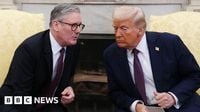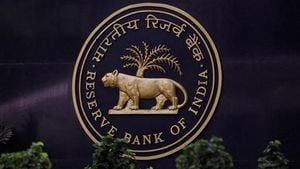British Prime Minister Keir Starmer and US President Donald Trump engaged in a crucial phone call on Sunday, March 30, 2025, to discuss a UK-US "economic prosperity deal." This conversation comes amid heightened tensions surrounding Trump's recent announcement of a 25% tariff on imported cars and car parts, set to take effect on April 2, 2025. According to a statement from 10 Downing Street, both leaders emphasized the importance of ongoing negotiations, which will continue at pace this week.
Last Wednesday, March 26, Trump revealed his plans for the tariffs, which pose a significant threat to the UK automotive industry, particularly as the US represents the largest single export market for UK-produced vehicles. Despite the looming tariffs, the UK government has signaled that it will not retaliate immediately, aiming instead for a diplomatic resolution.
During the call, Trump also extended his best wishes to King Charles III, who recently experienced temporary side effects from cancer treatment. This personal touch reflects the ongoing relationship between the leaders and their nations.
Starmer updated Trump on the "productive discussions" that took place at the Coalition of Willing meeting in Paris the previous week. The two leaders agreed on the necessity of maintaining collective pressure on Russian President Vladimir Putin regarding the ongoing conflict in Ukraine. They expressed their commitment to staying in contact as the situation develops.
The impending tariffs have raised concerns among UK negotiators, who are racing against the clock to secure an exemption. Starmer has previously stated that while he does not wish to enter a trade war with the US, the UK "reserves the right" to impose reciprocal tariffs if a deal cannot be reached.
Economic analysts have warned that a trade war could have dire consequences for the UK economy. The independent Office for Budget Responsibility (OBR) has projected that retaliatory measures could wipe billions off economic growth, significantly impacting Chancellor Rachel Reeves' ability to adhere to fiscal rules. In a severe scenario, the OBR estimates that GDP could be 0.6% lower than previously forecast this year and 1% lower next year.
In contrast, if the UK refrains from retaliation, the OBR forecasts a smaller reduction in growth, with GDP expected to be 0.4% lower this year and 0.6% lower next year. This nuanced understanding of the economic implications underscores the stakes involved in the ongoing negotiations.
UK car exports are valued at approximately £7.6 billion annually, and the US is the second-largest market for British cars, trailing only the European Union. The potential tariffs could severely impact luxury car manufacturers such as Rolls-Royce and Aston Martin, which are particularly vulnerable to changes in trade policy.
Trump has argued that his tariffs are designed to bolster American manufacturing and protect jobs. However, he has also acknowledged that prices for consumers could rise as a result of his measures. In a recent statement, he remarked that he "couldn't care less" if carmakers increase prices, as this would encourage consumers to purchase American-made vehicles.
In their previous meeting at the White House, Trump hinted at the possibility of a "real trade deal," which could spare the UK from the tariffs he has threatened against other nations. This glimmer of hope for a beneficial resolution adds a layer of complexity to the ongoing discussions.
The situation remains fluid, with both leaders aware of the urgent need to navigate these economic challenges while maintaining a strong diplomatic relationship. As negotiations unfold, the focus will be on finding common ground that benefits both nations without escalating into a trade conflict.
As the deadline for the tariffs approaches, the UK government is exploring various options for potential retaliation, should it become necessary. These could range from imposing duties on sectors where British products hold significant importance in the US market to targeting specific products, such as Harley Davidson motorcycles.
In conclusion, the phone call between Starmer and Trump highlights the delicate balance of international trade relations and the need for effective diplomacy in addressing economic disputes. With both leaders committed to ongoing dialogue, the coming days will be critical in determining the future of UK-US trade relations and the broader implications for both economies.




